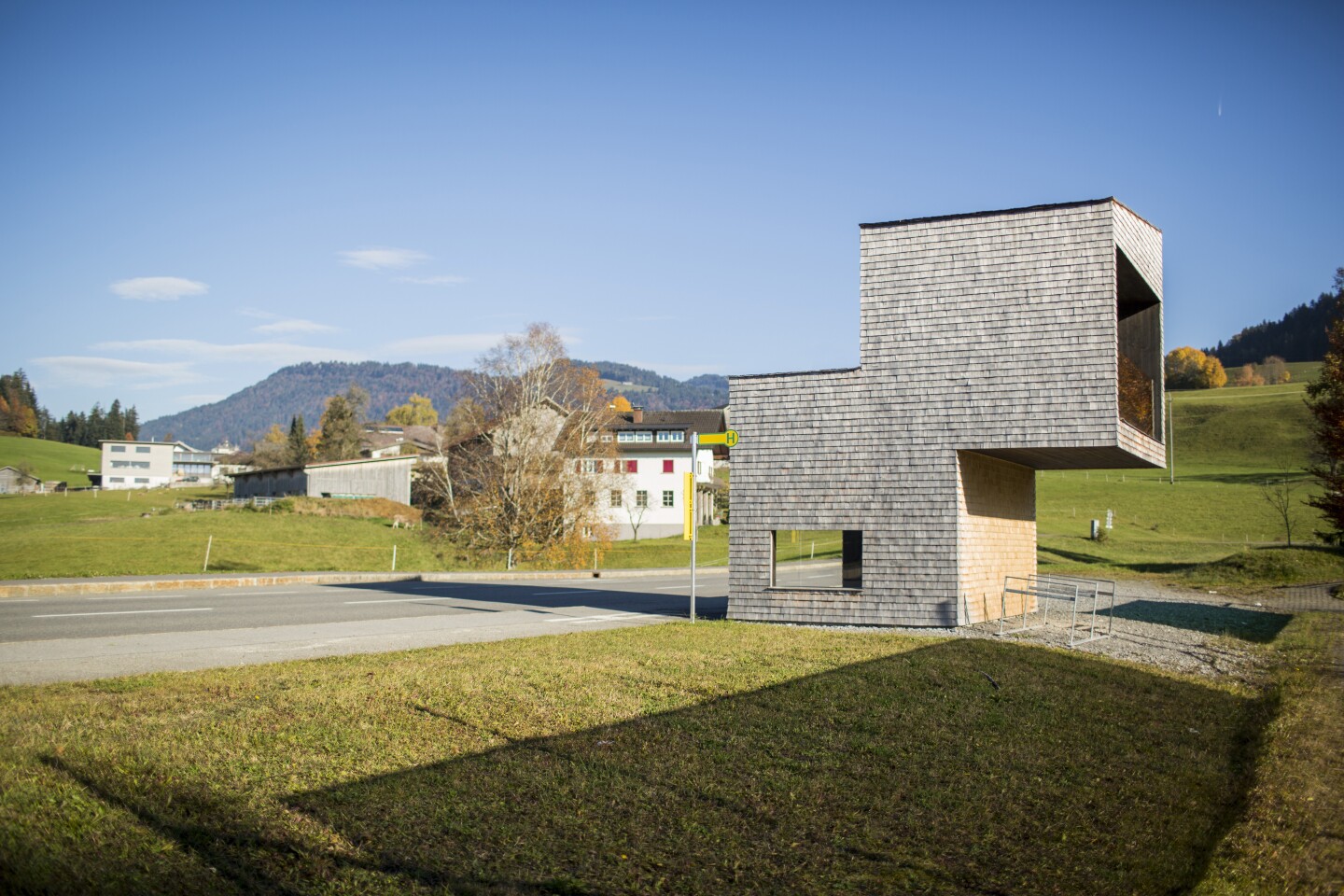In Bregenzerwald, Austria, you don’t need to look far for inspiration. Each of the region’s 23 charming villages studded throughout Vorarlberg in the western part of the Austrian Alps contains its own particular riches, with rivers, rolling mountains, and immaculate valleys lovingly tended to by local farmers. What makes this area truly exceptional, however, is its forests—and what their craftspeople do with them.
The citizens of this region, known as Bregenzerwälder, are renowned throughout the nation to strive for excellence when it comes to cuisine. Still, with the tenacious determination to live in harmony with nature, plus centuries of extraordinary design manifest in each quaint village, it’s woodworking—namely in the realms of interior design and architecture—which truly sets them apart. In fact, woodworking has been a tradition here since the 17th century.

One of Krumbach’s avant-garde bus stops
Courtesy of Vorarlberg Tourism/Darko Todorovic
For design-minded Bregenzerwälder residents such as Georg Bechter, an architect hailing from the village of Hittisau, woodwork represents a sacred collaboration with one’s neighbors, a collectively infectious effort to appropriately reflect the beauty which surrounds them. “When [your] neighbor does it, and the results are the talk of the community,” Bechter says, “then the next one does not even think twice about building with wood.” Thanks to a local culture of pushing forward and doing better, beautiful and norm-bending wooden architecture has become, well, the norm.

Town square in Mellau, Bregenzerwald
Courtesy of Bregenzerwald Tourism/Johannes Fink
Thus, a tradition which began as a modest source of secondary income for farmers blossomed into a regional calling card. Hand-crafted from local species such as beech, fir, spruce, or elm, the ornate wooden frontages which have defined these villages for centuries have endured for a reason. Evolving with the elements, whether untreated or stained, such shingles are affordable, sustainable, and have proven to be singularly effective at insulation from both heat and cold. Not least of all, they’re simply stunning to behold.
From the deceptively simple Salgenreute Chapel, channeling the tranquility of the surrounding mountains, to private homes, hotels, local fire stations, and the Frauenmuseum Hittisau—an award-winning museum devoted to the cultural achievements of women—these modern, timeless structures are, above all, designed to evoke the warmth of wood and calm of nature.
Being raised within reach of such natural wealth leaves an inescapable and enduring impact on the woodworkers of Bregenzerwald. Approaching their work with reverence, these artisans understand the great responsibility they owe to future generations in the preservation of their region’s bounty. “Every electrician, every carpenter has a highly developed sense for beautiful things,” notes 10th-generation Bregenzerwälder Peter Fetz. “All these puzzle pieces make up an ecosystem that in turn nourishes things of quality and beauty.”

Hotel Gasthof Hirschen on the village square in Schwarzenberg
Courtesy of Bregenzerwald Tourism/Ian Ehm
Fetz, who’s worked throughout Europe, from London to Paris, carries on an important tradition in the operation of his family’s Hotel Hirschen, an historic structure in the village of Schwarzenberg. Since 1755, the Hirschen has been wowing guests with its undulating shingled facade, rustic-chic paneled walls, and delicate parquet. Like the cuisine on offer in their restaurant, which strives to curate local ingredients and traditional recipes in ever-innovative ways, the hotel’s indisputably modern feel wouldn’t exist without its proud, rich past.
It’s this contradiction that’s essential, according to Markus Faisst, the master woodworker behind the pioneering workshop Holz werkstatt in Hittisau. For Faisst, “it’s not folkloric and old.” He says, “It’s about how can you use this tradition and make something for today, relevant for the modern world that we are in.”
A visit to the Werkraum Bregenzerwald, an association of about 100 of the region’s artisans that also serves as a storefront for their designs, confirms - how designers approach traditions with an eye on pushing past its history and beyond its borders. In the shop and cafeteria, visitors can browse locally made cosmetics, taste regional products, or purchase hand-hewn products. They might also explore Bregenzerwald’s largest collection of design literature in the onsite bookstore or discover some of the latest innovations and innovators in the field through a rolling calendar of exhibitions.

Werkraumhaus in Andelsbuch, Bregenzerwald
Courtesy of Peter Loewy
Whatever visitors do, they’ll go home instilled with a sense of appreciation for that invaluable material which continues to define Bregenzerwald’s past, present, and future: wood. Without it and the ancient forests from which it is harvested, the Bregenzerwälder know they’d be lost. “I love working with wood that I can embrace in tree form,” Bechter says. From the village to the forest, it’s a particular kind of beauty that we all can appreciate.
Though the region of Bregenzerwald seems remote, it’s still relatively easy to get to. International visitors can access the region by train from major cities such as Zurich, Innsbruck, or Munich, while the many buses and trains can be taken to cities such as Bregenz, Dornbirn, Feldkirch and Bludenz from throughout Europe.
For more information on this one-of-a-kind region, visit www.austria.info/afar.











